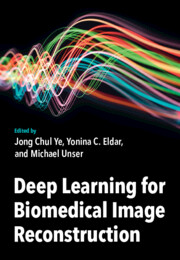Book contents
- Frontmatter
- Dedication
- Contents
- List of Contributors
- Preface
- Part I Theory of Deep Learning for Image Reconstruction
- Part II Deep-Learning Architecture for Various Imaging Architectures
- 5 Deep Learning for CT Image Reconstruction
- 6 Deep Learning in CT Reconstruction: Bringing the Measured Data to Tasks
- 7 Overview of the Deep-Learning Reconstruction of Accelerated MRI
- 8 Model-Based Deep-Learning Algorithms for Inverse Problems
- 9 k-Space Deep Learning for MR Reconstruction and Artifact Removal
- 10 Deep Learning for Ultrasound Beamforming
- 11 Ultrasound Image Artifact Removal using Deep Neural Networks
- Part III Generative Models for Biomedical Imaging
9 - k-Space Deep Learning for MR Reconstruction and Artifact Removal
from Part II - Deep-Learning Architecture for Various Imaging Architectures
Published online by Cambridge University Press: 15 September 2023
- Frontmatter
- Dedication
- Contents
- List of Contributors
- Preface
- Part I Theory of Deep Learning for Image Reconstruction
- Part II Deep-Learning Architecture for Various Imaging Architectures
- 5 Deep Learning for CT Image Reconstruction
- 6 Deep Learning in CT Reconstruction: Bringing the Measured Data to Tasks
- 7 Overview of the Deep-Learning Reconstruction of Accelerated MRI
- 8 Model-Based Deep-Learning Algorithms for Inverse Problems
- 9 k-Space Deep Learning for MR Reconstruction and Artifact Removal
- 10 Deep Learning for Ultrasound Beamforming
- 11 Ultrasound Image Artifact Removal using Deep Neural Networks
- Part III Generative Models for Biomedical Imaging
Summary
Inspired by the success of deep learning in computer vision tasks, deep learning approaches for various MRI problems have been extensively studied in recent years. Early deep learning studies for MRI reconstruction and enhancement were mostly based on image-domain learning. However, because the MR signal is acquired in the k-space domain, researchers have demonstrated that deep neural networks can be directly designed in k-space to utilize the physics of MR acquisition. In this chapter, the recent trend of k-space deep learning for MRI reconstruction and artifact removal are reviewed. First, scan-specific k-space learning, which is inspired by parallel MRI, is covered. Then we provide an overview of data-driven k-space learning. Subsequently, unsupervised learning for MRI reconstruction and motion artifact removal are discussed.
Information
- Type
- Chapter
- Information
- Deep Learning for Biomedical Image Reconstruction , pp. 200 - 222Publisher: Cambridge University PressPrint publication year: 2023
